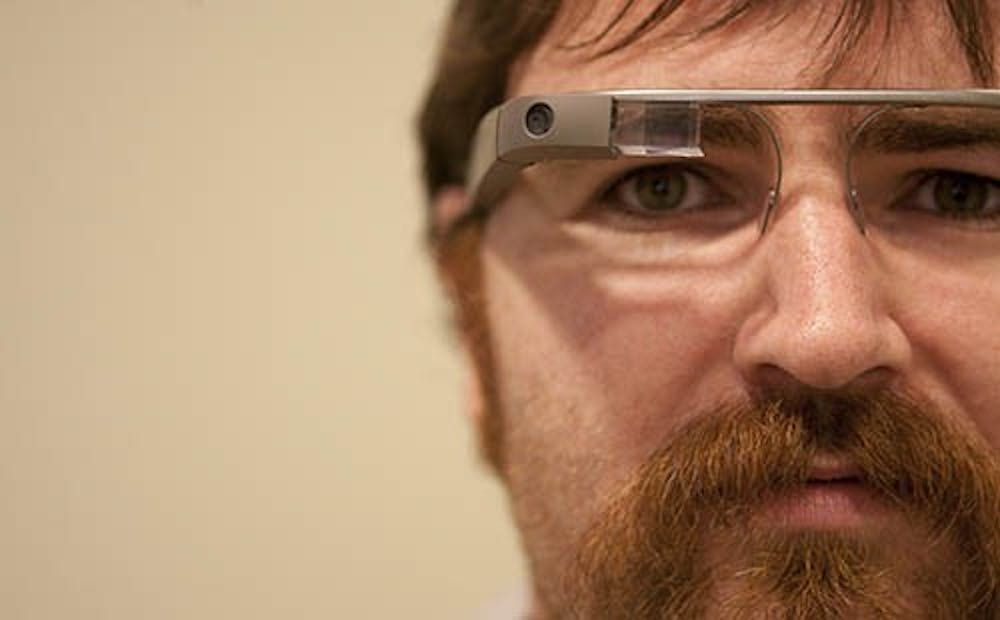A new form of technology has found its way to Ball State this summer. Google Glass, a new product released by Google, is being used by two staff members and a student.
Glass is worn like a pair of glasses, but there are no frames or lenses. Instead, there is a small screen and projector over the right eye that projects an image right onto the user’s retina. The user, once activating glass, will see an overlay of the information on top of what they would regularly be seeing.
A smart phone acts as a connection for the Glass. Glass connects to a phone through Bluetooth, which is how it is able to access the web. As of now Glass is in a developer’s state, with people in the industry testing the product. The current model is called the “Explorer” and retails for $1,500.
“It would be a lot for a consumer to pay,” said Chris Turvey, a developer at Ball State’s iLearn lab. “It will be placed within the $300 to $600 price point.”
He does not think this price will be an issue,
“This is the most technologically advanced piece of anything I’ve ever been able to hold… People are going to buy it no matter the price,” Turvey said.
Josh Lowe, a senior computer science major, works in the Emerging Media Lab. Lowe has had his own Glass system for around a month and a half and is enjoying the personality of the system.
“I love how it’s hands free,” he said. “I could be doing something with Glass while I’m talking to someone, or doing something else. I can do things with it and not miss everything around me. I’m not zoned into a screen.”
One of the most notable things about Glass is the camera feature. With a simple vocal command Glass will take a picture, or record a video. Both Turvey and Lowe think Glass could change the way that people learn.
“You put a student teacher out in the field, they record their own lecture with this and… send the video back to their teacher,” Turvey said. “Think of the money that the university spends just sending out master teachers to just observe student teachers. They can get through two or three students a day on that kind of model. You can get though four to five a day with [the help of Glass].”
Turvey said he uses his Glass most of the time during the day, with the exception of when he is working as his desk.
“I don’t wear them to the bathroom. I’m still hesitant with that,” he said.
It can sometimes cause unwanted attention in public, Lowe said.
“If I’m going be sitting down for dinner with someone, or a group of people, I don’t want to have them on,” he said. “I will be at the table and they will be at the center of attention, and not actually hanging out with people. If I was not the only one to have it, it would be different.”
The Bi-Partisan Privacy Caucus, headed by Senator Joe Barton of Texas, recently wrote a letter of concern to Google’s CEO Larry Page expressing some of their concerns about Glass and its effects on privacy. According to the letter, these concerns included protection of non users from being filmed against their knowledge, unwilling data collection from both users and non users, as well as the use of facial recognition software on Glass.
Google responded with a statement addressing each of these issues.
“As we do for all of our products, we are carefully reviewing the design of Glass for privacy considerations as part of Google’s comprehensive privacy program,” they said in the statement.
“If you look back at articles that were written seven, eight years ago when camera phones started coming out, everyone was worried that there would be no privacy… That did not happen at all,” Turvey said. “There are much more elaborate and hidden ways that I record you, other than putting a camera on my face.”
Lowe agreed with Turvey.
“I think it’s no more intrusive than someone watching you,” he said.
Glass does have some built-in precautions against innapropriate use.
“It’s required for Google to have the screen on while the camera is on, at all times,” Lowe explained. “It’s really obvious if I’m doing anything with it.”





